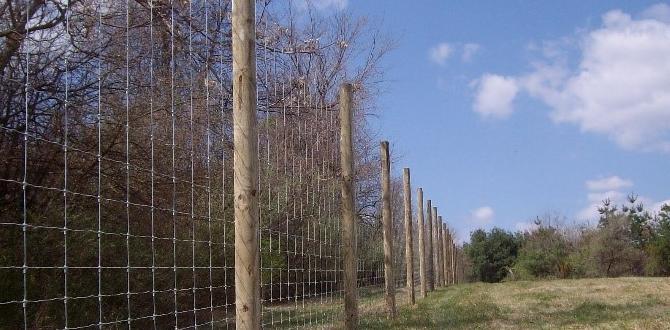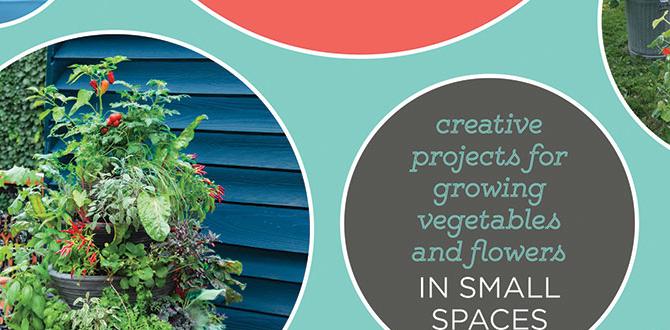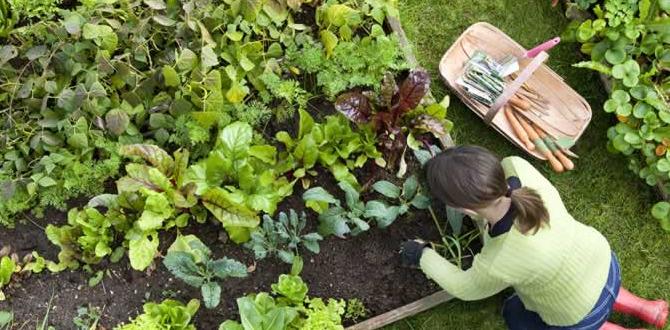Gardening can be a fulfilling and enjoyable hobby, providing a sense of tranquility and accomplishment as you watch your plants grow and flourish. However, the presence of squirrels can quickly turn this peaceful pastime into a frustrating battle.
These small, furry creatures can wreak havoc on your garden beds, digging up bulbs, eating fruits and vegetables, and causing general chaos. While there are various methods to keep squirrels at bay, many involve using harmful chemicals or investing in expensive deterrents.
But fear not; there are natural and effective ways to keep these critters out of your garden beds without compromising the health of your plants or breaking the bank. Here, we will explore some simple and eco-friendly how to keep squirrels out of garden beds naturally, allowing you to enjoy your gardening experience to the fullest.
By implementing these methods, you can create a harmonious environment where your plants can thrive, and squirrels can find other sources of food and entertainment. So, let’s dive into the world of natural squirrel control and discover how to keep these pesky creatures out of your garden beds.
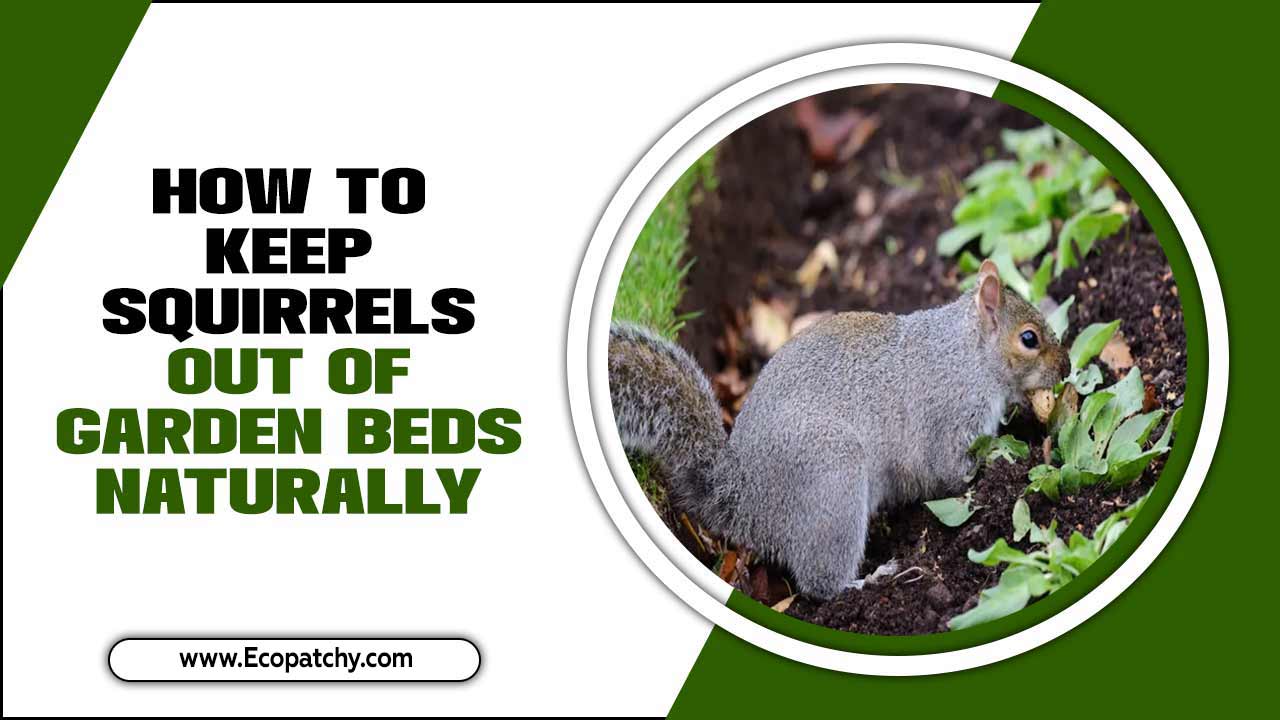
The Importance Of An Eco-Friendly Approach
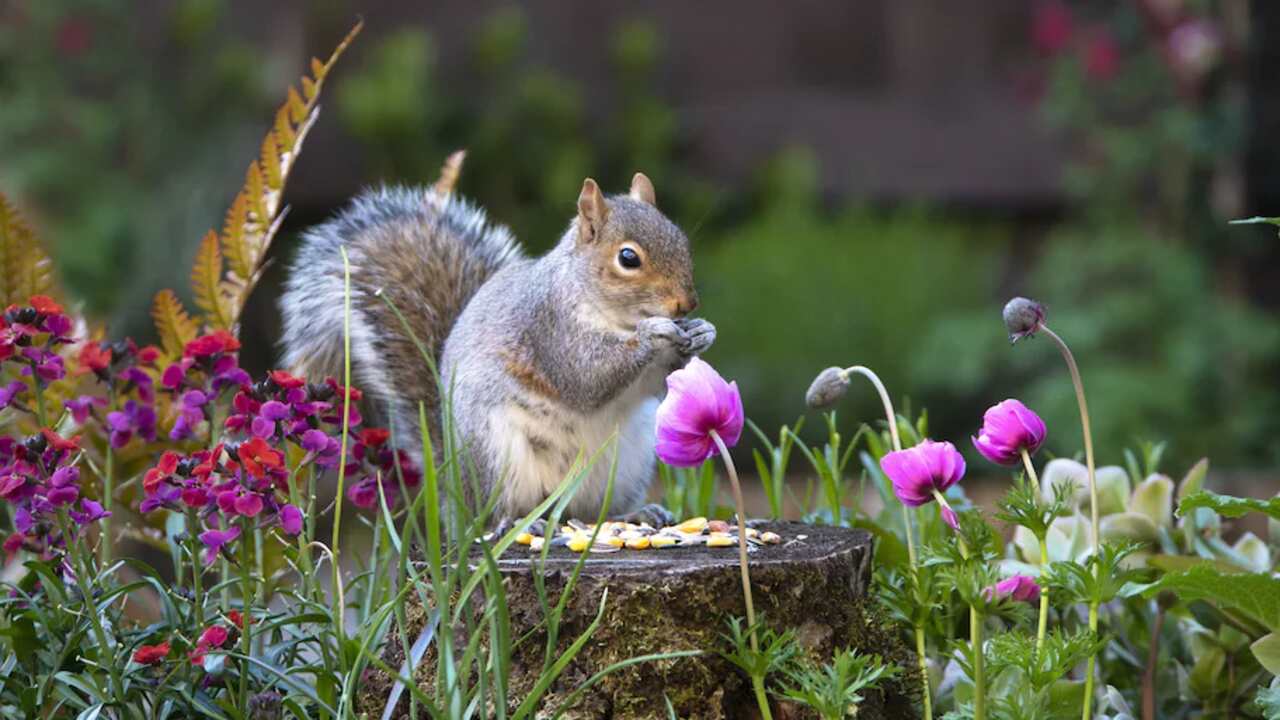
Choosing eco-friendly solutions when it comes to keeping squirrels out of your garden beds is beneficial for you and the environment and wildlife. By opting for eco-friendly methods, you ensure the safety of children, pets, and beneficial insects who might come in contact with your garden. Moreover, avoiding harmful chemicals helps maintain a healthy ecosystem, allowing you to work harmoniously with nature.
An eco-friendly approach promotes sustainability and reduces pollution, making it a responsible choice for gardeners. So, consider using natural deterrents and techniques instead of relying on commercial repellents or harmful substances. Let’s keep our gardens thriving while protecting local wildlife and the environment.
Behavior And Habits
Squirrels are well-known for their impressive acrobatic climbing and jumping abilities, allowing them to navigate trees and other structures easily. They are attracted to various food sources, including bird seed, berries, and garden vegetables. These energetic rodents tend to be most active during the day, particularly in the early morning and late afternoon.
When it comes to creating a cozy home, squirrels build nests known as dreys in trees or even in attics. However, their constant gnawing can be problematic, causing damage to structures and plants. Understanding these behaviors and habits is important to keep squirrels out of garden beds effectively.
8 Eco-Friendly Solutions: How To Keep Squirrels Out Of Garden Beds Naturally
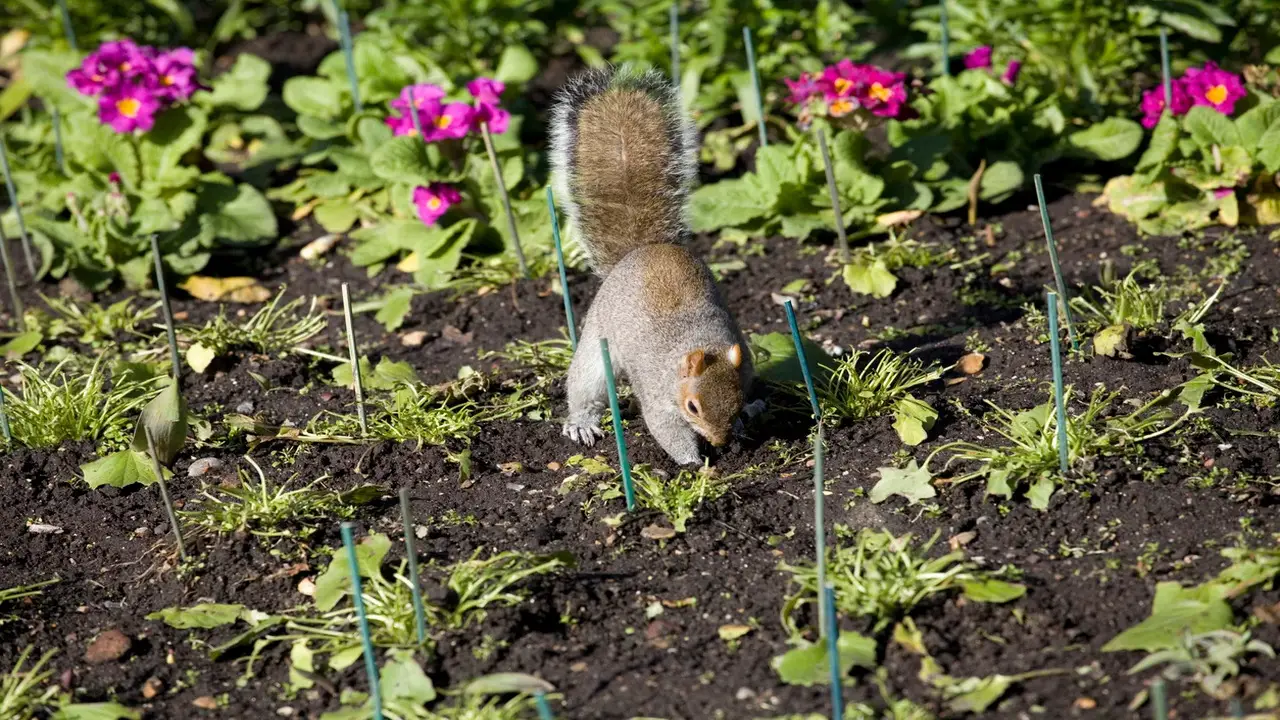
Maintaining a lush and thriving garden can be fulfilling, but it often comes with its fair share of challenges. One common obstacle gardeners face is the relentless intrusion of squirrels into garden beds. These small creatures can wreak havoc on delicate plants, digging up bulbs and feasting on fruits and vegetables.
However, resorting to harmful pesticides or inhumane trapping methods is not the answer. Instead, several eco-friendly solutions can effectively deter squirrels from infiltrating your garden beds. Here, we will discuss 8 eco-friendly solutions: how to keep squirrels out of garden beds naturally.
Creating A Squirrel-Proof Garden Bed: Physical Barriers
To create a squirrel-proof garden bed, you can install fencing or wire mesh as a barrier. This will prevent squirrels from accessing your garden beds and damaging your plants. Additionally, you can use row covers to protect seedlings from squirrel damage. Another option is to place squirrel baffles on poles or bird feeders near your garden beds to deter squirrels from climbing and reaching the plants.
Using hardware cloth to cover planting holes can also help prevent squirrels from digging and disturbing your plants. Surrounding your garden beds with gravel or mulch can further discourage squirrels from digging in the area. By implementing these physical barriers, you can keep squirrels out of your garden beds and protect your plants from interference.
Natural Repellents: Planting Squirrel-Resistant Plants
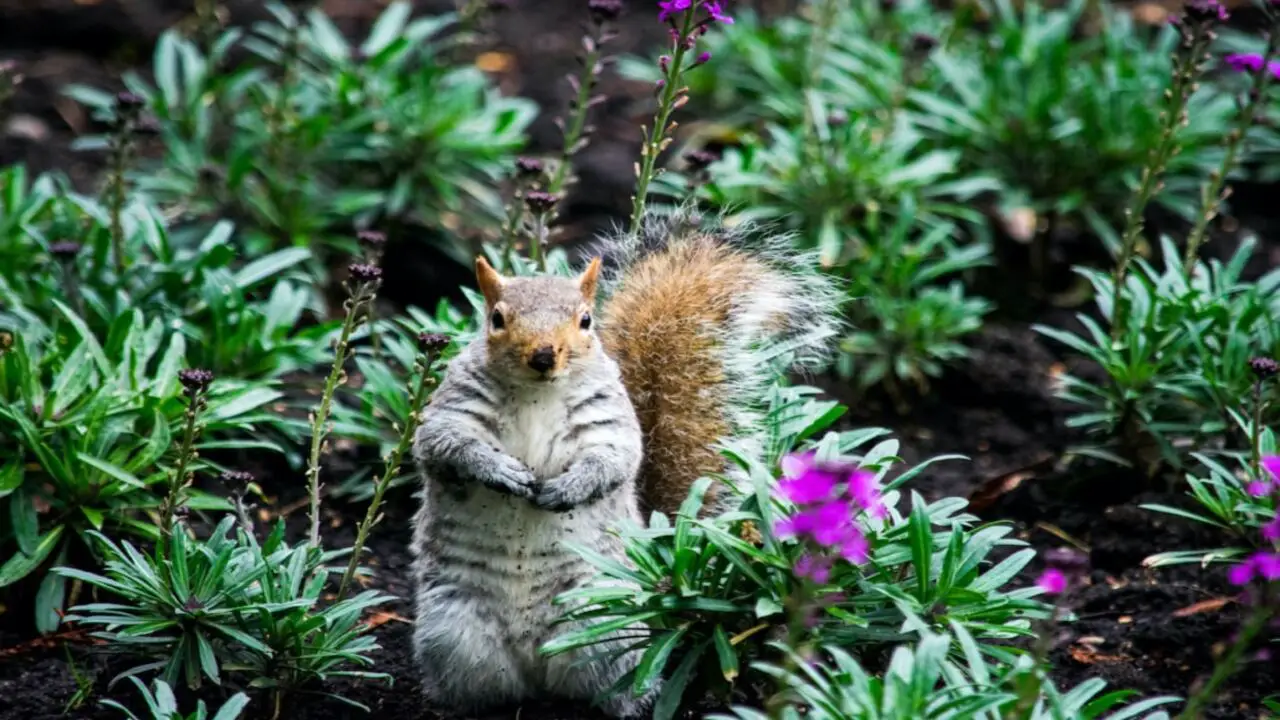
When naturally keeping squirrels out of your garden beds, you can try several effective methods. One option is to plant daffodils, alliums, and snowdrops, as squirrels tend to avoid these flowers. Another natural repellent is mint, as squirrels dislike its smell. Planting mint near your garden beds can help deter them.
Marigolds are another great choice; their strong scent deters squirrels from entering garden areas. Mustard plants produce a natural repellent that squirrels find unappealing, making them a good addition to your garden. Additionally, muscari, or grape hyacinths, are generally unattractive to squirrels. Incorporating these squirrel-resistant plants into your garden can create a natural barrier to keep these little guys away.
Scent-Based Deterrents: Using Natural Odors To Repel Squirrels
To keep squirrels out of garden beds naturally, there are scent-based deterrents you can try. One option is to sprinkle cayenne pepper or chili powder around the garden beds. This creates a strong scent that squirrels find unpleasant and helps repel them. Another natural odor that deters squirrels is apple cider vinegar. Soak rags in the vinegar and place them near the garden beds.
The smell will discourage the little guys from getting too close. Coffee grounds can also be used as a repellent. Spread them around the garden beds to create an unpleasant scent that squirrels don’t like. Finally, the strong scent of capsaicin from chili peppers and ammonia can also deter squirrels. Placing soaked rags or cotton balls near the garden beds with these odors can help keep them away.
Sound-Based Deterrents: Using Noise To Keep Squirrels Away
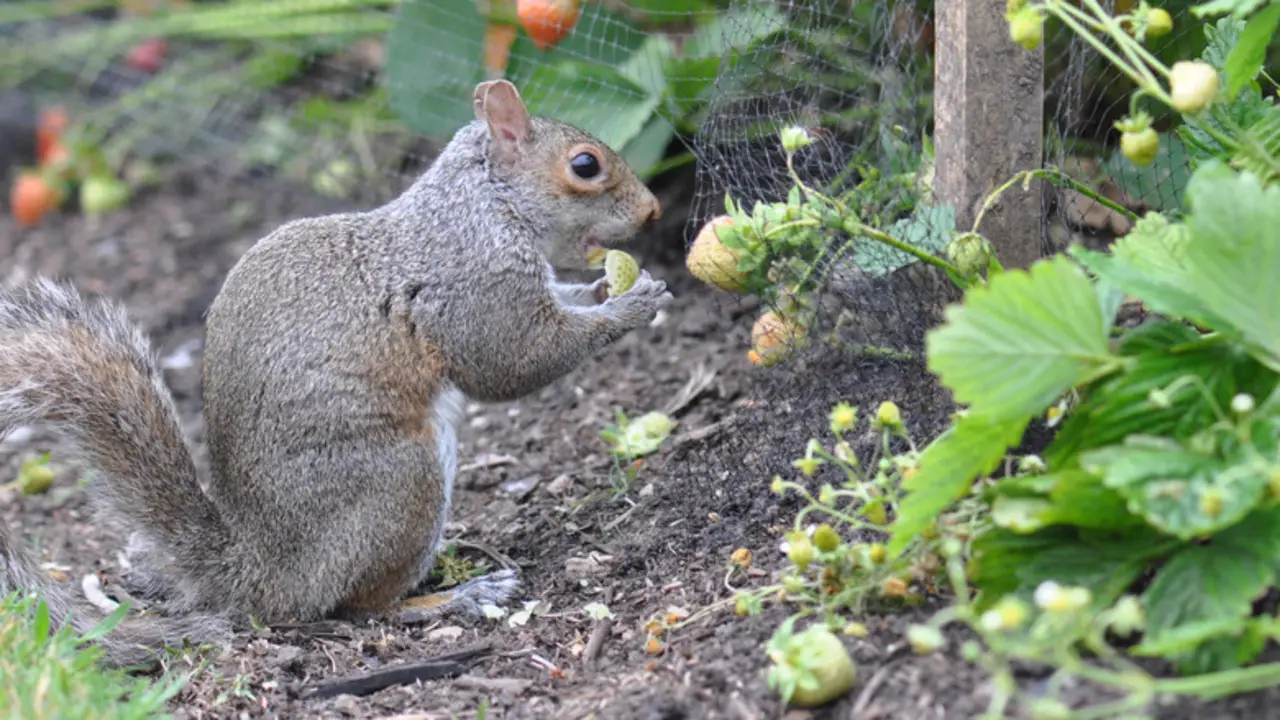
To deter squirrels from your garden beds, you can utilize sound-based deterrents. Wind chimes or bells are a great option, as they create a constant noise that squirrels find annoying and tend to avoid. Another effective method is to play a radio or music near your garden beds, which can help keep squirrels away from the constant background noise.
Placing aluminum foil or pans near the garden beds is another effective solution, as they will create noise when disturbed by squirrels. Additionally, you can consider using ultrasonic devices that emit high-frequency sounds that squirrels find irritating. Lastly, motion sensor sprinklers can startle and deter squirrels with sudden activation. By implementing these sound-based deterrents, you can effectively keep squirrels out of your garden beds naturally.
Visual Deterrents: Scarecrows, Reflective Objects, And More
Gardeners have long used scarecrows to frighten squirrels away from garden beds. Hanging reflective objects like CDs or aluminum foil strips can deter squirrels, as the flashing lights and movement make them uneasy. Another effective method is using scare-eye balloons or owl decoys, which mimic natural predators and scare squirrels off.
Placing fake snakes or predators near garden beds can also be a deterrent, as squirrels are naturally wary of these creatures. Additionally, using pinwheels or spinning devices creates movement in the garden, which can help scare away squirrels. By incorporating these visual deterrents, you can protect your garden from these pesky pests without the need for harmful chemicals or traps.
Removing Attractants: Proper Waste Management And Storage
Proper waste management and storage are crucial for keeping squirrels out of your garden beds: store bird seed, nuts, and other food sources in airtight containers to prevent attracting squirrels. Keep your garbage cans tightly sealed to avoid providing an easy food source for squirrels. Regularly cleaning fallen fruits or nuts from the ground will also help remove potential food sources.
Trim tree branches near your garden beds to prevent squirrels from accessing them and causing damage. Finally, keeping compost piles covered and away from garden beds is essential to avoid luring squirrels with the smell of decaying organic matter. Following these steps can significantly reduce the likelihood of squirrels invading your garden beds and damaging your plants.
Creating Alternative Food Sources: Distracting Squirrels From Garden Beds
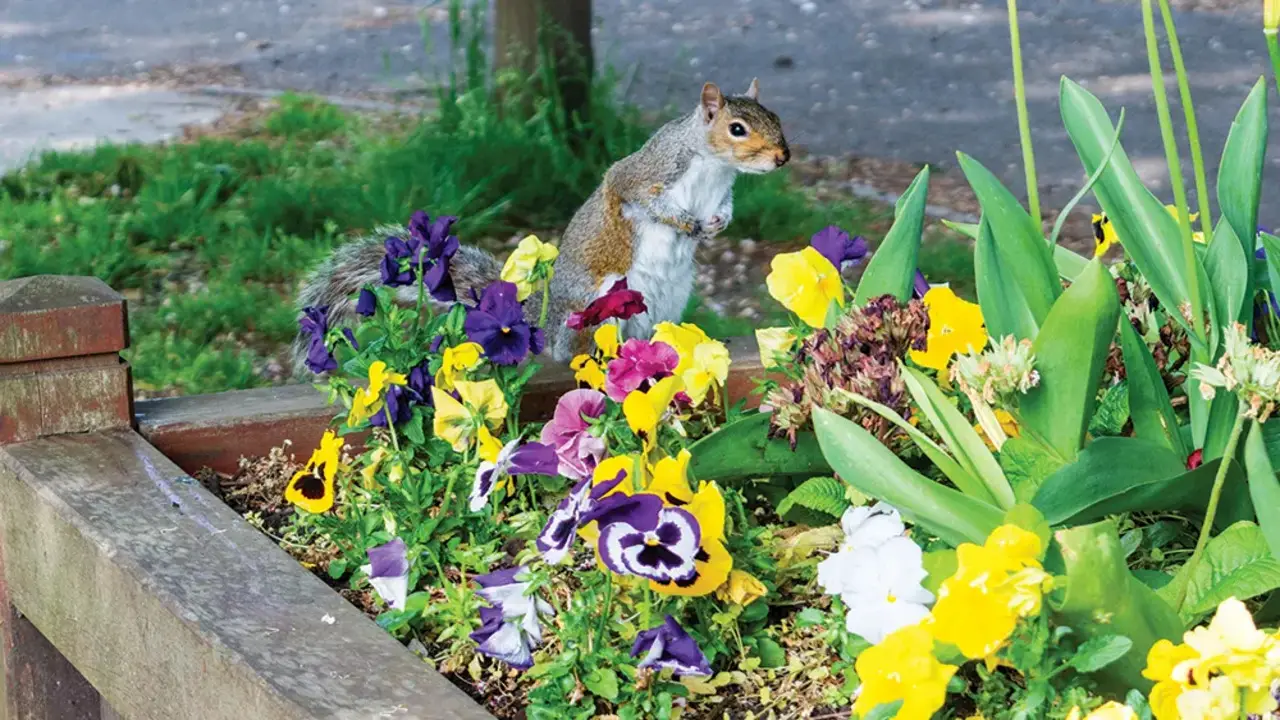
To distract squirrels from garden beds, gardeners can create alternative food sources. One option is to set up a separate bird feeder stocked with squirrel-friendly seeds. This diverts their attention away from the garden beds and towards the feeder. Another strategy is to plant sunflowers or safflower seeds in a designated area. This provides food specifically for squirrels, keeping them occupied.
Installing a squirrel feeder away from the garden beds also effectively encourages squirrels to feed elsewhere. Additionally, placing birdhouses or nesting boxes can provide alternative shelter for squirrels. Growing fruit trees or berry bushes away from the garden beds can attract squirrels and keep them occupied.
Encouraging Natural Predators: Attracting Squirrel Predators To Your Yard
To naturally deter squirrels from your garden beds, consider attracting their natural predators to your yard. One effective method is to invite owls and hawks by setting up perches or nesting boxes. These birds of prey will help keep the squirrel population in check.
Creating a welcoming habitat for snakes can also be beneficial, as they are natural squirrel predators. Planting trees that provide shelter and food for birds of prey will further encourage their presence in your yard. Installing motion sensor sprinklers can help deter squirrels while attracting larger predators. Finally, avoiding chemical pesticides that may harm these natural squirrel predators is important.
Maintaining A Sustainable Garden: Tips For Long-Term Squirrel Prevention And Garden Care
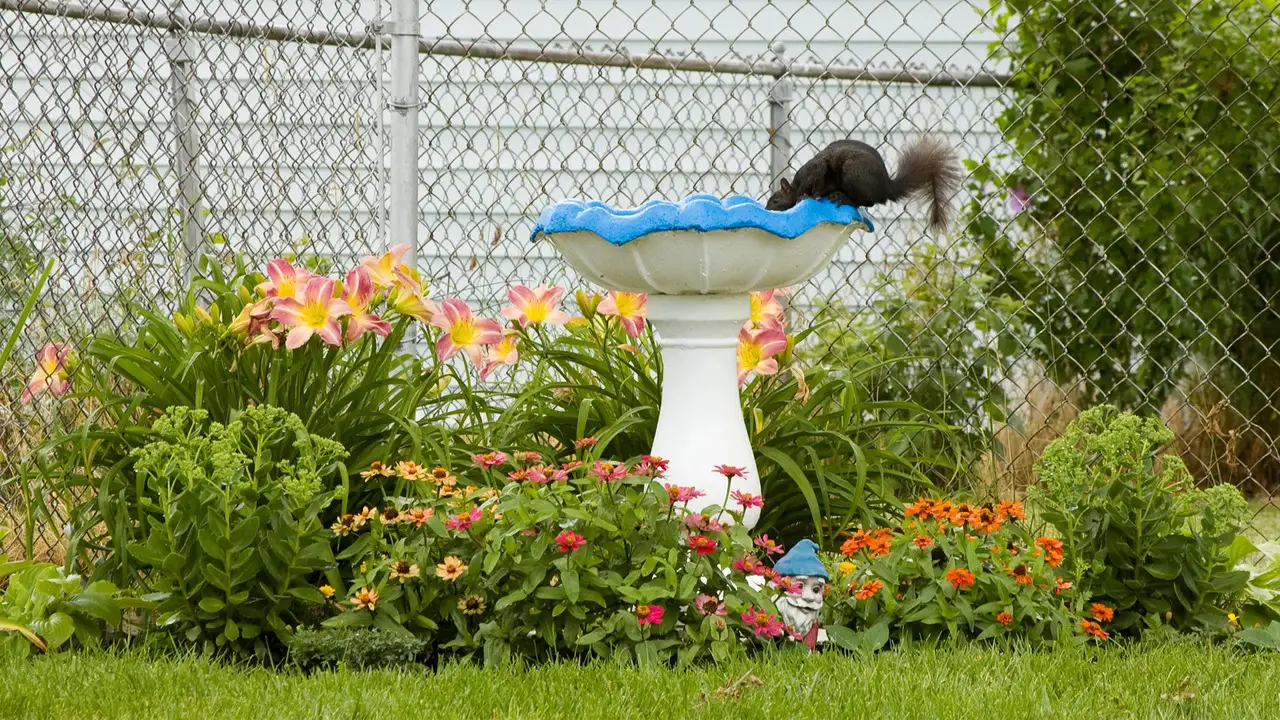
Maintaining a sustainable garden is essential for long-term squirrel prevention and garden care. By implementing these strategies, you can create a squirrel-free environment in your garden while maintaining a sustainable approach. Here are some tips to keep squirrels out of your garden beds naturally:
- Use Physical Barriers: Install fences or netting around your garden beds to prevent squirrels from accessing them.
- Plant Deterrents: Squirrels dislike certain plants, such as daffodils, marigolds, and garlic. Planting these around your garden beds can help deter them.
- Remove Food Sources: Clean bird feeders and fallen fruits to eliminate potential food sources that may attract squirrels.
- Use Natural Repellents: Sprinkle cayenne pepper or place mothballs near your garden beds to repel squirrels. Be sure to reapply after rainfall.
- Create Distraction Areas: Set up a separate area with squirrel-friendly food, such as corn or peanuts, away from your garden beds to redirect their attention.
Conclusion
keeping squirrels out of your garden beds naturally is not an impossible task. You can create a squirrel-proof garden by adopting an eco-friendly approach and understanding squirrel behavior. Physical barriers, such as fences and netting, can keep squirrels away. Planting squirrel-resistant plants and using natural repellents like strong odors or noise can deter them.
Additionally, removing attractants and creating alternative food sources can redirect their attention. Lastly, encouraging natural predators and maintaining a sustainable garden will help in long-term squirrel prevention.
By implementing these natural solutions, you can protect your garden beds and enjoy the fruits of your labor without unwelcome visitors. We hope you understand how to keep squirrels out of garden beds naturally.
Frequently Asked Questions
1.How Do I Keep Squirrels From Digging In My Raised Beds?
Ans: Cover squirrels with wire mesh or chicken wire to prevent them from digging in your raised beds—plant squirrel-resistant flowers like daffodils, alliums, and hyacinths. Create a separate feeding area for squirrels away from the garden beds. Use natural deterrents like cayenne pepper or garlic sprays to keep them at bay.
2.What Do Squirrels Hate The Most?
Ans: Squirrels strongly dislike certain smells like peppermint, garlic, and vinegar. They also can’t stand spicy or bitter flavors like cayenne pepper or hot sauce. Additionally, planting daffodils or hyacinths can help repel squirrels. Alternative food sources like bird feeders can also deter them from garden beds.
3.What Is The Best Squirrel Deterrent For Gardens?
Ans: Spicy substances like cayenne pepper, peppermint oil, and garlic work well as natural squirrel deterrents. Physical barriers such as fencing or netting can also be effective. Squirrel-proof bird feeders can help reduce the number of squirrels in your yard. Choose the best squirrel deterrent based on your specific needs.
4.How Do I Get The Squirrels To Stop Destroying My Plants?
Ans: Use physical barriers like chicken wire or netting to keep squirrels out of garden beds—plant squirrel-resistant flowers such as daffodils, alliums, and hyacinths. Eliminate food sources that attract squirrels, like bird feeders and fallen fruit. Consider natural repellents such as garlic spray or cayenne pepper.
5.How Do You Plan A Garden Plot?
Ans: To plan a garden plot, choose the location and size, considering factors like sunlight and soil quality. Research the specific needs of the plants you want to grow and create a layout, mapping out where each plant will be placed.


